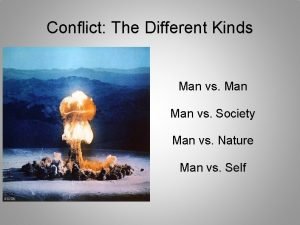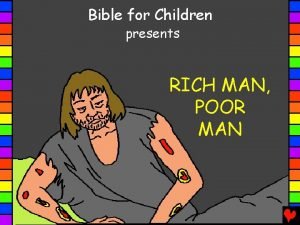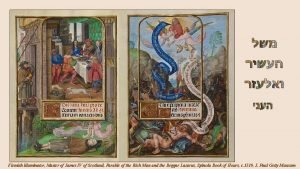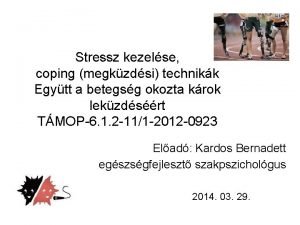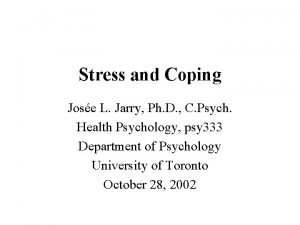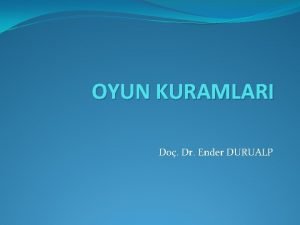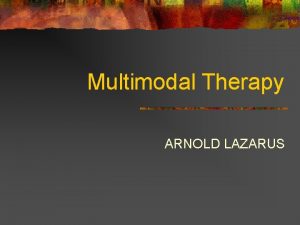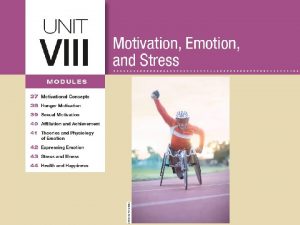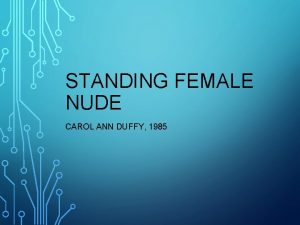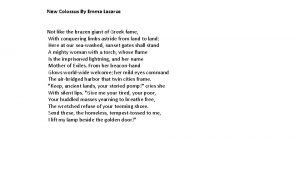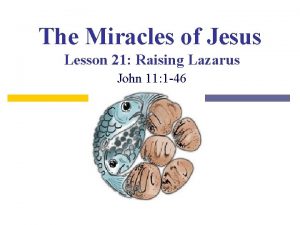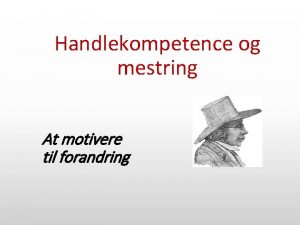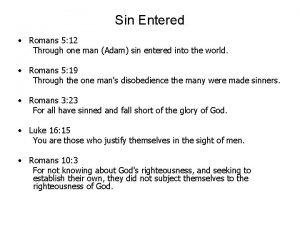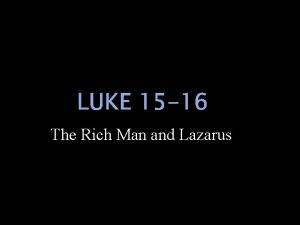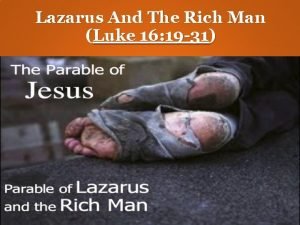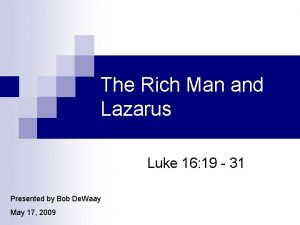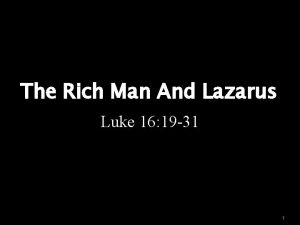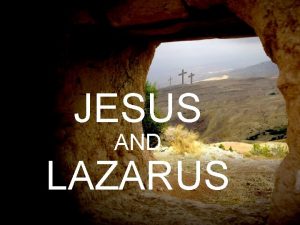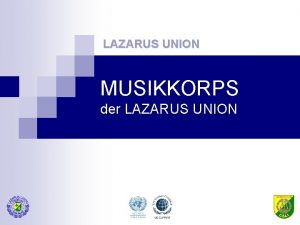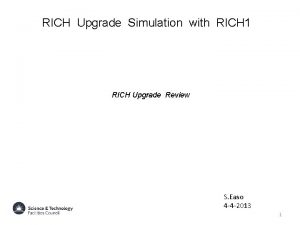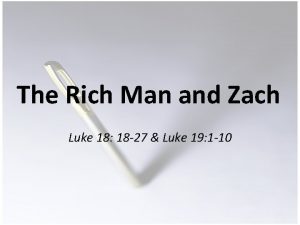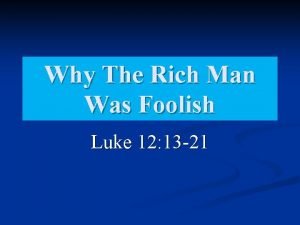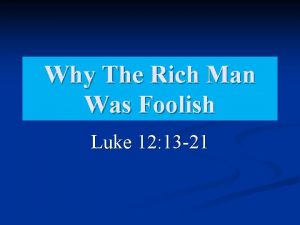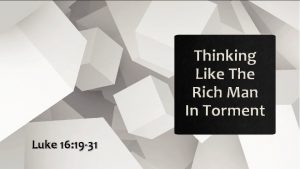The Rich Man and Lazarus Luke 16 19


























































- Slides: 58

The Rich Man and Lazarus Luke 16: 19 -31

The Text: Luke 16: 19 -31 “There was a certain rich man who was clothed in purple and fine linen and fared sumptuously every day. But there was a certain beggar named Lazarus, full of sores, who was laid at his gate, desiring to be fed with the crumbs which fell from the rich man's table. Moreover the dogs came and licked his sores. So it was that the beggar died, and was carried by the angels to Abraham's bosom. The rich man also died and was buried. And being in torments in Hades, he lifted up his eyes

The Text: Luke 16: 19 -31 “Then he cried and said, 'Father Abraham, have mercy on me, and send Lazarus that he may dip the tip of his finger in water and cool my tongue; for I am tormented in this flame. ‘ But Abraham said, 'Son, remember that in your lifetime you received your good things, and likewise Lazarus evil things; but now he is comforted and you are tormented. And besides all this, between us and you there is a great gulf

The Text: Luke 16: 19 -31 “Then he said, 'I beg you therefore, father, that you would send him to my father's house, 'for I have five brothers, that he may testify to them, lest they also come to this place of torment. ‘ Abraham said to him, 'They have Moses and the prophets; let them hear them. ‘ And he said, 'No, father Abraham; but if one goes to them from the dead, they will repent. ‘ But he said to him, 'If they do not hear Moses and the prophets, neither will they be persuaded though one rise from the dead. '"

Introduction • This is a real story about a true event: – He named the two characters in the story. – He also named places. – Neither at the beginning or ending did Jesus refer to the story as a parable. – If it was a parable, it doesn’t change the truths we learn. – Jesus never told a fable or untrue story to illustrate a truth. – His parables were of events that could or did happen in real life.

Introduction • This is a real story about a true event: – It seems evident that the event occurred during the Mosaic Dispensation. – Mentioning that the brothers could “hear Moses and the prophets” indicates that Moses’ Law was still in effect. – The story, however, reveals truth that is characteristic of all dispensations. 1. Patriarchal Age 2. Gospel Age. – Present State; Intermediate State; Final State


The Present State • This story refers to the life on earth that exists from birth until death. • The time on earth is a ”testing” or “preparation” time. • It is also an “opportunity” time. – Opportunity to serve our Maker – Decide to be faithful or unfaithful – Live righteously or unrighteously – Walk by faith or by sight

The Present State • This story refers to the life on earth that exists from birth until death. • One chooses to serve God or Satan. • No matter which we choose, there will be consequences. – If we serve God faithfully—Heaven – If we serve Satan and sin—Hell

The Intermediate State • Refers to the time between death and the final resurrection. • Hades is the unseen world. • The words “Hades” is used ten times in the NT: (KJV—Hell; ASV—Hades) – Matthew 11: 23; 16: 18; – Luke 10: 15; 16: 23; – Acts 2: 27; – Revelation 1: 18; 6: 8; 20: 13, 14

The Intermediate State • Refers to the time between death and the final resurrection. • When a person dies, he is transported to Hades. • Hades is a place of “departed spirits. ” • Here, the righteous and the wicked are kept until the final resurrection. • At that time, “death and Hades will give up the dead in them, ” (Revelation 20: 13).

The Final State • Refers to the time between the resurrection and the judgment. • One’s existence will be either Heaven or Hell. • This will be an eternal state that will have no ending, regardless which way it goes! – Matthew 25: 46

Christ • While on earth, Jesus was a spirit dwelling in a tabernacle of clay. – John 1: 1, 14 • That spirit was immortal/eternal. – Hebrews 9: 14 • Though He came from heaven, He took on the form of a servant who was made in the likeness of men. – Philippians 2: 5 -8

Christ • Like everyone else, on occasion, He needed sleep, rest, food, clothing, and shelter from the elements, as well as all other needs common to a man’s body. • His was an immortal Spirit in a mortal body. • He was One of a kind—in a class by Himself! • Following His (physical) death, His body was placed in a tomb. – Luke 23: 53

Christ • His spirit went into Paradise, the righteous side of Hades. – Psalm 16: 10; Luke 23: 43; Acts 2: 27 • He did not go to God or heaven. – John 20: 17 • Hades and Heaven are two distinct places.

Rich Man and Lazarus • Both of these men had mortal bodies and immortal spirits. – Matthew 10: 28; Romans 6: 12 • At birth, our earthly parents, through procreation, provide us with earthly bodies. • God forms the spirit within the earthly body, giving life to a tabernacle of clay. – Zechariah 12: 1; James 2: 26

Rich Man and Lazarus • Each individual is born pure and holy, having committed no sin and having inherited none. – Ezekiel 18: 20 -24 • Both the rich man and Lazarus had committed sin. – Romans 3: 23; 1 John 1: 8 • Evidently, Lazarus had been faithful to God, under Moses’ Law—righteousness. • The rich man failed to serve God faithfully; he chose to be lost!

Death • Death is separation. • When faith is separated from works (obedience), it is a “dead” faith. – James 2: 24 • When one has trespasses and sins, he is separated from God—dead spiritually. – Isaiah 59: 1, 2; Ephesians 2: 1 • A Christian is “dead” to the Old Law— separated from it. – Romans 7: 1 -6

Death • Without the spirit, the body is dead. – James 2: 26 • When the body and spirit are separated, the body dies—life on earth ends. • The body is buried and ultimately, returns to the earth. – Ecclesiastes 12: 7 • The disembodied spirit, whether righteous or wicked, enters the Hadean world.

Abraham’s Bosom and Paradise • After Lazarus died, the angels carried him to Abraham’s bosom. • Jesus told the thief on the cross, “Today thou shall be with me in paradise. ” – Luke 23: 43 • Paradise is the side into which the righteous descend. • Here (in Paradise), Lazarus was comforted. – Luke 16: 25

Abraham’s Bosom and Paradise • Peter’s confession was the “Rock” on which Christ would build His church. • The Gates of Hades would not prevail against it. • His death would not prevent the building of His church. – Matthew 16: 17, 18 • Possibly…even though members of the kingdom die and enter Hades—they will not miss the bliss of heaven!

Abraham’s Bosom and Paradise • The Devil has authority over the Hadean realm. • Only a few were resurrected to then die again and return. • Could there have been a great spiritual battle between Jesus and the Devil while Jesus was in Hades? • We know who won! – Revelation 1: 18 – Hebrews 2: 14, 15

Abraham’s Bosom and Paradise • In this realm, the Lord will have the final say! • At the appropriate time, the voice of Jesus will call those in this realm. – John 5: 28, 29 • After the judgment, death and Hades will be cast into the lake of fire—they’ll no longer be needed. – Revelation 20: 14

The Great Gulf • There is a gulf between the two different parts of the Hadean realm. (Luke 16: 26) • This gulf was fixed by God. • It’s so high that no one can go over it. • It’s so long that no one can go around it. • It’s so deep that no one can go under it. • It’s so strong that no one can go through it. • It’s so wide that no one can cross it. • One is on one side or the other; it CANNOT BE CHANGED!

Torment • This part of Hades is often referred to as “Tartarus. ” • This word refers to a place into which sinful angels were cast and reserved in “chains of darkness unto judgment. ” – 2 Peter 2: 4 • It is a place of torments. • While Lazarus was comforted, the rich man was tormented! – Luke 16: 23 -25

Tomb • The mortal body’s burial place. • Jesus’ body was placed in Joseph’s new tomb; it did not remain there long enough to become corrupt. – Luke 23: 50 -53; Acts 2: 27 • The rich man was buried in a tomb. – Luke 16: 22 • The body returns to the dust from which it came. – Genesis 3: 19

The Resurrection • Jesus predicted the destruction of His “temple”—but not for long! – “Jesus answered and said to them, ‘Destroy this temple, and in three days I will raise it up. ’” {John 2: 19} • Who and what are the “I” and the “it? ” – The I — Jesus – The IT — His body • Prophesy said His body would not see corruption or His spirit remain in Hades. – Psalm 16: 8 -10; Acts 2: 27

The Resurrection • What does it all mean? • So Jesus’ spirit came from the Hadean realm and reunited with His body, giving it life again —body and Spirit! • All men—both righteous and wicked—will be resurrected at the same time! – “Do not marvel at this; for the hour is coming in which all who are in the graves will hear His voice and come forth--those who have done good, to the resurrection of life, and those who have done evil, to the resurrection of

The Resurrection • What kind of bodies will the resurrected have? • Paul spoke of the resurrected bodies of the righteous—nothing is said about the unrighteous… • “So also is the resurrection of the dead. The body is sown in corruption, it is raised in incorruption. It is sown in dishonor, it is raised in glory. It is sown in weakness, it is raised in power. It is sown a natural body, it is raised a spiritual body. There is a natural

The Judgment • This is not listed on our chart—it takes place after the resurrection and before final rewards. • Judgment is certain. • “For we must all appear before the judgment seat of Christ, that each one may receive things done in the body, according to what he has done, whether good or bad. ” {2 Corinthians 5: 10} – No one will escape this judgment!

The Judgment • Greatest Judge: Jesus Christ, God’s Son – Acts 17: 30 • Greatest Crowd: All from Adam on – 2 Corinthians 5: 10 • Greatest Standard: God’s word, the truth – Romans 2: 2 • Greatest Record: The Book of Life – Revelation 20: 12, 15

The Judgment • Greatest Verdict: Come or depart – Matthew 25: 34, 41 • Greatest Award: Eternal life – Matthew 25: 46 • Greatest Condemnation: Everlasting punishment – 2 Thessalonians 1: 8, 9

Heaven • The place prepared for those who are faithful to God… – “Blessed be the God and Father of our Lord Jesus Christ, who according to His abundant mercy has begotten us again to a living hope through the resurrection of Jesus Christ from the dead, to an inheritance incorruptible and undefiled and that does not fade away, reserved in heaven for you, who are kept by the power of God through faith for salvation ready to be revealed in the last time. ” {1 Peter 1: 3 -5}

Heaven • The place prepared for those who are faithful to God… – “. . . Who are these arrayed in white robes, and where did they come from? And I said to him, ‘Sir, you know. ’ So he said to me, ‘These are the ones who come out of the great tribulation, and washed their robes and made them white in the blood of the Lamb. Therefore they are before throne of God, and serve Him day and night in His temple. And He who sits on the throne will dwell among them. ’” {Revelation 7: 13 -15}

Heaven • The place prepared for those who are faithful to God… – “They shall neither hunger anymore nor thirst anymore; the sun shall not strike them, nor any heat; for the Lamb who is in the midst of the throne will shepherd them and lead them to living fountains of waters. And God will wipe away every tear from their eyes. ” {Revelation 7: 16, 17}

Hell (Gehenna) • The place of Divine retribution for one’s evil deeds. Used 12 times in the NT. – “If your right eye causes you to sin, pluck it out and cast it from you; for it is more profitable for you that one of your members perish, than for your whole body to be cast into hell. And if your right hand causes you to sin, cut it off and cast it from you; for it is more profitable for you that one of your members perish, than for your whole body to be cast into hell. ” {Matthew 5: 29, 30}

Hell (Gehenna) • The place of Divine retribution for one’s evil deeds. Used 12 times in the NT. – “If your hand causes you to sin, cut it off. It is better for you to enter into life maimed, rather than having two hands, to go to hell, into the fire that shall never be quenched— where 'Their worm does not die, And the fire is not quenched. ’” {Mark 9: 43} – “But I will show you whom you should fear: Fear Him who, after He has killed, has power to cast into hell; yes, I say to you, fear Him!” {Luke 12: 5}

Hell (Gehenna) • Described as… – Lake of fire – Where the worm does not die – Fire is not quenched – Outer darkness – Eternal separation from God – With the devil and his angels – Tormented day and night • One does NOT want to be in this place!

Things the Rich Man Learned Too Late • He failed to learn them, so they were of no value to him after death—but they can be valuable lessons for us: 1. What it is to be truly successful. • Riches are not a mark of true success. • Lazarus had no worldly goods, but He was successful. • Success is not determined by one’s bank account or possessions. (Luke 12: 15)

Things the Rich Man Learned Too Late • He failed to learn them, so they were of no value to him after death—but they can be valuable lessons for us: 2. Too late, he learned that the torments and misery beyond death are real! • Indescribably great • Flames that cannot be extinguished with any amount of water! • Understanding it will never end! (Matthew 25: 46)

Things the Rich Man Learned Too Late • He failed to learn them, so they were of no value to him after death—but they can be valuable lessons for us: 3. Too late, he learned about loving God, obeying His will, and walking with Him—he should have paid more attention. • Obedience does matter! • God’s laws were given for a purpose. • God’s justice demands consequences. (Hebrews 5: 9)

Things the Rich Man Learned Too Late • He failed to learn them, so they were of no value to him after death—but they can be valuable lessons for us: 4. Too late, he learned the importance of warning and influencing others (especially those dear to him) to prepare for eternity! • Wasted opportunities! • Warnings that should have been heeded. • The truth of God’s words. (Matthew 7: 21)

Things the Rich Man Learned Too Late • He failed to learn them, so they were of no value to him after death—but they can be valuable lessons for us: 5. Too late, he learned that his sins could and would separate him from God and keep him out of heaven! • Choices mean something! • Terribleness of sin. • What could have been… {Romans 6: 23}

Things the Rich Man Learned Too Late • He failed to learn them, so they were of no value to him after death—but they can be valuable lessons for us: 6. Too late, he learned that whatever a man sows, he will also reap! • The value of spiritual choices. • No one to blame but himself. • Should have considered more carefully. {Galatians 6: 7, 8}

From This Impressive and Instructive Historical Story We May Learn… 1. Between death and the resurrection, there is an intermediate place of existence (Hades) where the immortal spirit abides. 2. The spirit that gives life to the body does not die with the physical body. 3. The spirit is conscious after death; it does not sleep or go out of existence (annihilated) until the resurrection as some teach.

From This Impressive and Instructive Historical Story We May Learn… 4. Angels escorted Lazarus to Abraham’s bosom. Does this mean that all the righteous will have some type of escort? Not needing to face the unknown alone. 5. After death, the righteous go to a place of comfort; it is referred to as paradise or Abraham’s bosom.

From This Impressive and Instructive Historical Story We May Learn… 6. immediately following death, the wicked are consigned to a place of torment and misery. 7. When death comes, a person’s eternal destiny is sealed. There are no second chances. In Hades, one cannot cross from the side of torments to the side of comfort.

From This Impressive and Instructive Historical Story We May Learn… 8. God’s word provides sufficient information and warning to prepare us for death and the future life. In this dispensation, we have the gospel of Christ revealed in the New Testament. It appeals to reason, conscience, emotions, hopes, and fears. It is God’s power to save, for in it is revealed God’s plan for saving mankind. It is His final appeal to us. No dead person will return to this world to tell anyone about

From This Impressive and Instructive Historical Story We May Learn… 9. In verse 24 and in John 13: 26, we have the only times where the Greek word for baptism is translated. In all other places where the word is found, it is transliterated. That is, English letters have been substituted for the Greek letters, euphemized, and pronounced in English. In verse 24 and in John 13: 26, it’s translated dip, dipped. If the men who translated the Bible had translated the Greek word for baptism in all other places, they would have prevented a lot of controversy and helped readers to see the truth about the

This Story Refutes Some Doctrinal Errors 1. It refutes Universalism. – Universalism teaches that ALL will be saved. – The rich man was “tormented in this flame. ” – In lost condition and suffering punishment – Punishment is as certain as salvation. • • Luke 16: 24 Matthew 25: 46 John 5: 28, 29 Revelation 21:

This Story Refutes Some Doctrinal Errors 2. It refutes the claims of Spiritualism. – Spiritualism is the belief that the living can communicate with the dead. – There was no communication between the rich man and his brothers, or even between Lazarus and the brothers. – In the Old Testament, such attempts were punishable by death. • Deuteronomy 18: 9 -14

This Story Refutes Some Doctrinal Errors 3. It refutes the doctrine of Purgatory. 1. The Council of Trent taught, “That God does not always remit the temporal punishment due to forgiven sin. The Scriptures teach that nothing defiled can enter heaven…and that Christians often die with venial sins upon their souls. All, therefore, who die in venial sins, or with the temporal punishment of their sins still unpaid must atone for them in Purgatory. ” (Bertrand L. Conway, C. S. P. the Question Box, pg. 394)

This Story Refutes Some Doctrinal Errors 3. It refutes the doctrine of Purgatory. – The Rich Man could not pass from the torment side of Hades to the comfort side because their was a great gulf FIXED. (Luke 16: 26) – The eternal destinies of righteous Lazarus and the wicked Rich Man were sealed at the moments of their deaths. – They could not be changed by suffering, prayer, suffrages of faithful friends on earth, or by acceptable sacrifices on the altar!

This Story Refutes Some Doctrinal Errors 4. It refutes the doctrine of direct operation of the Holy Spirit. 1. The doctrine says that you are born with Adam’s sin and are totally depraved so you cannot do anything to be saved. 2. You must wait for the Holy Spirit to do His work on you to enable you to believe and obey. 3. The Rich Man did not request that the Holy Spirit go to his brothers; he asked Abraham to send Lazarus. (Luke 16: 27 -31)

This Story Refutes Some Doctrinal Errors 4. It refutes the doctrine of direct operation of the Holy Spirit. – Jesus taught that men are saved through the preaching of the word. (John 6: 44, 45) – The apostle Paul said that the gospel is God’s power unto salvation. (Romans 1: 16, 17)

This Story Refutes Some Doctrinal Errors 5. It refutes the doctrine of Predestination. – This is Calvinistic doctrine that says God predetermined and pre-selected certain ones to be saved and certain ones to be lost, and there is nothing an individual can do about it. – The Rich Man wanted Lazarus to return to his brothers for he knew that they could escape the torments of Hades and hell if they would hear and obey his words.

This Story Refutes Some Doctrinal Errors 5. It refutes the doctrine of Predestination. – Abraham told him they had the prophets and Moses—obedience to their words would allow them to avoid torments. – It’s a matter of man’s choice—not God’s! • • • Matthew 11: 28 -30 2 Peter 3: 9 Acts 13: 46

 Examples of man vs. society
Examples of man vs. society Rich man poor man bible
Rich man poor man bible Dives and lazarus
Dives and lazarus The rich young man matthew
The rich young man matthew Coping technikák
Coping technikák Lazarus definition
Lazarus definition Erikson oyun kuramı
Erikson oyun kuramı Lazarus basic id model
Lazarus basic id model Mrs midas analysis
Mrs midas analysis Mrs midas poem carol ann duffy
Mrs midas poem carol ann duffy Lazarus ap psych
Lazarus ap psych Disgusting food
Disgusting food Lazarus model of appraisal
Lazarus model of appraisal Lazarus definition
Lazarus definition The most dangerous game powerpoint
The most dangerous game powerpoint 1985
1985 Mrs lazarus poem
Mrs lazarus poem Magdeburg ivories
Magdeburg ivories Lazarus entwicklungsumgebung
Lazarus entwicklungsumgebung Why does she want the wretched refuse of teaming shores?
Why does she want the wretched refuse of teaming shores? Lazarus miracles jesus
Lazarus miracles jesus Hypotalamusz
Hypotalamusz Lazarus's appraisal theory
Lazarus's appraisal theory John 11 38 44
John 11 38 44 Cannon-bard theory vs james-lange
Cannon-bard theory vs james-lange Many people
Many people Penelope poem by carol ann duffy
Penelope poem by carol ann duffy Mestring lazarus
Mestring lazarus Neoconductismo mediacional
Neoconductismo mediacional Through one man sin entered the world, and through one man
Through one man sin entered the world, and through one man Old man and new man
Old man and new man An hungry man is an angry man
An hungry man is an angry man Hình ảnh bộ gõ cơ thể búng tay
Hình ảnh bộ gõ cơ thể búng tay Bổ thể
Bổ thể Tỉ lệ cơ thể trẻ em
Tỉ lệ cơ thể trẻ em Gấu đi như thế nào
Gấu đi như thế nào Glasgow thang điểm
Glasgow thang điểm Chúa yêu trần thế
Chúa yêu trần thế Môn thể thao bắt đầu bằng từ chạy
Môn thể thao bắt đầu bằng từ chạy Thế nào là hệ số cao nhất
Thế nào là hệ số cao nhất Các châu lục và đại dương trên thế giới
Các châu lục và đại dương trên thế giới Công của trọng lực
Công của trọng lực Trời xanh đây là của chúng ta thể thơ
Trời xanh đây là của chúng ta thể thơ Mật thư tọa độ 5x5
Mật thư tọa độ 5x5 Làm thế nào để 102-1=99
Làm thế nào để 102-1=99 Phản ứng thế ankan
Phản ứng thế ankan Các châu lục và đại dương trên thế giới
Các châu lục và đại dương trên thế giới Thể thơ truyền thống
Thể thơ truyền thống Quá trình desamine hóa có thể tạo ra
Quá trình desamine hóa có thể tạo ra Một số thể thơ truyền thống
Một số thể thơ truyền thống Cái miệng nó xinh thế chỉ nói điều hay thôi
Cái miệng nó xinh thế chỉ nói điều hay thôi Vẽ hình chiếu vuông góc của vật thể sau
Vẽ hình chiếu vuông góc của vật thể sau Thế nào là sự mỏi cơ
Thế nào là sự mỏi cơ đặc điểm cơ thể của người tối cổ
đặc điểm cơ thể của người tối cổ Thế nào là giọng cùng tên?
Thế nào là giọng cùng tên? Vẽ hình chiếu đứng bằng cạnh của vật thể
Vẽ hình chiếu đứng bằng cạnh của vật thể Tia chieu sa te
Tia chieu sa te Thẻ vin
Thẻ vin
